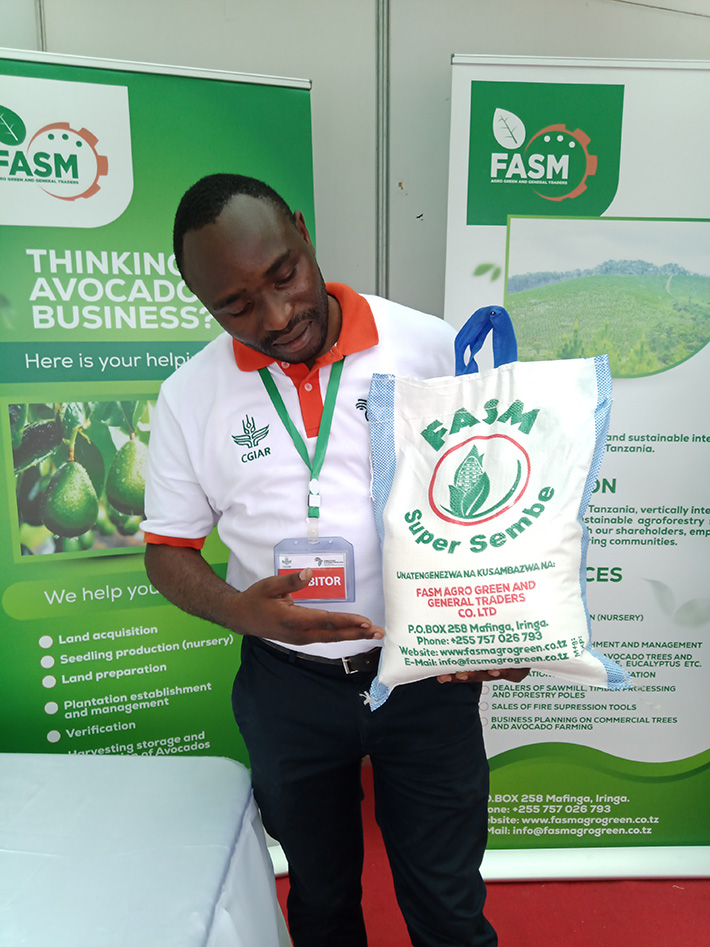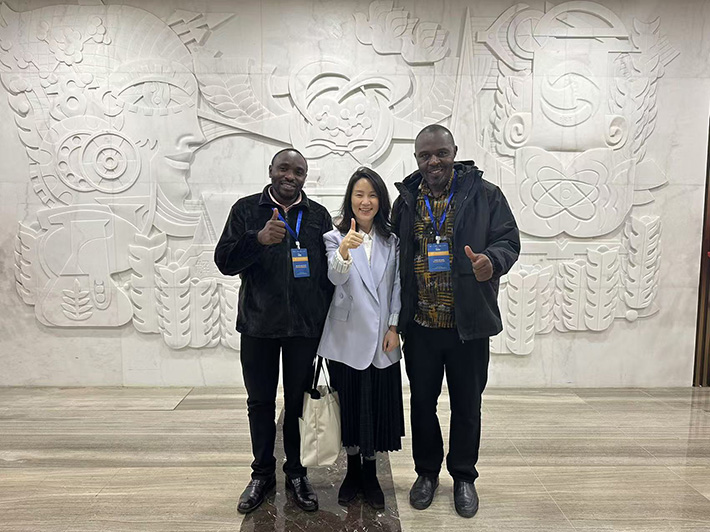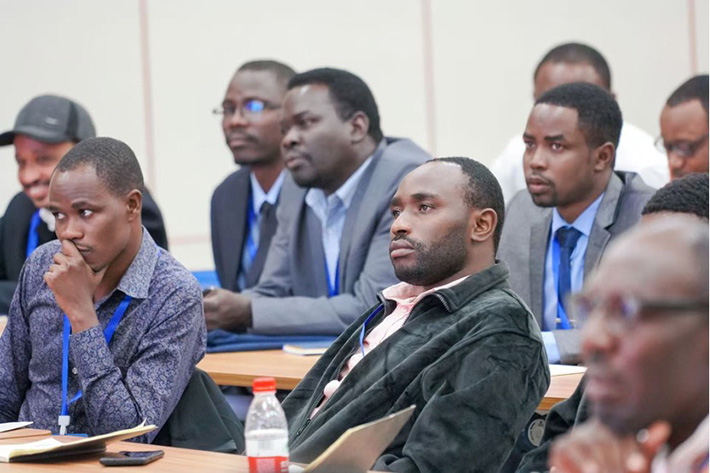|
||||||||||
| Home Top News Economy/Tech Culture/Sports China in Foreign Eyes Green Development Videos Intangible Cultural Heritages |
|
||||||||||
| Home Top News Economy/Tech Culture/Sports China in Foreign Eyes Green Development Videos Intangible Cultural Heritages |
| ChinAfrica |
| A Seed in the Wind |
| Young Tanzanian entrepreneur fights malnutrition while opening new horizons for local farming |
| By Li Xiaoyu | VOL. 17 October 2025 ·2025-10-10 |

Young Tanzanian entrepreneur Fadhili Albert Mwakamesa presents his product (COURTESY)
From widespread malnutrition and food insecurity to rising unemployment, the challenges facing Tanzanian agriculture weigh heavily on Fadhili Albert Mwakamesa. During his first field assignments as a young researcher at the International Institute of Tropical Agriculture (IITA), Mwakamesa was deeply shocked by what he saw. In villages surrounded by maize fields, children were visibly undernourished, lacking essential proteins and micronutrients in their daily meals. Farmers, meanwhile, harvested ample maize, but often failed to sell it at fair prices, and their soybeans attracted even less demand.
“It was heartbreaking to realise that food was available, but nutrition was missing,” he recalled. “That paradox convinced me that something had to change.”
Determined to act, Mwakamesa, who also coordinated youth agribusiness programmes at IITA, set his sights on using agriculture not merely for food production, but as a catalyst for job creation. His ambition is clear: to generate employment for more than 1,000 young Tanzanians while addressing both nutritional and commercial gaps. Out of this vision came Fasm Agro Green and General Traders, the company he founded in Mafinga Town, Iringa Region in south Tanzania. In addition to cultivating maize and wheat, the firm has pioneered a new approach: blending maize, the staple of local diets, with protein-rich soybeans to produce a highly nutritious flour.
Turning theory into practice, however, was far from easy. Many consumers were unfamiliar with the maize-soy blend, sometimes mistaking it for animal feed or seeing it as a mere side dish for ugali. Soy’s high protein and fat content also shortened the flour’s shelf life and occasionally altered its taste. Starting small, Mwakamesa and his team had to rely on modest equipment and a limited budget, which hindered their ability to scale production.
When he appeared to have hit a wall, a lifeline arrived in the form of the Young Rural Entrepreneurs Initiative, launched in August 2024 by China Agricultural University (CAU) and Tencent. The programme is designed to empower African youth leaders with technical training, managerial skills, and opportunities for international partnerships.

Fadhili Albert Mwakamesa (left) with his mentor Professor Xu Xiuli at CAU (COURTESY)
A turning point in training
Last November, as part of the programme’s inaugural cohort, Mwakamesa participated in an intensive training session in China, where the CAU team offered comprehensive guidance on product formulation and processing techniques. By fine-tuning the maize-to-soy ratio and adjusting drying temperatures, the flour became more digestible, more flavoursome, and less marked by the typical beany aroma. These technical refinements broadened its appeal, winning over mothers concerned with child nutrition and schools seeking healthier meal options.
The training extended well beyond food technology. Mwakamesa also participated in sessions on leadership and strategic management, learning how to set measurable goals, delegate responsibilities, monitor progress, and enhance accountability. “Previously, I often tried to do everything myself,” he admitted. “Now I understand how to build and trust my team.”
The results were immediate: efficiency soared and daily output increased from 2.5 to 9 tonnes. The company was able to invest in more advanced processing equipment.
Equally transformative were the impressions Mwakamesa brought back from China. He was struck by the discipline, punctuality, and perseverance with which the Chinese pursued their goals. Low-cost innovations, such as a mobile app developed by students to monitor product quality, demonstrated that creativity could flourish even under financial constraints. Inspired, he has begun learning Chinese, aiming to cultivate future partnerships and deepen cross-cultural understanding.

Fadhili Albert Mwakamesa (centre) during a training session at CAU in November 2024 (COURTESY)
Challenges ahead
Back home, Mwakamesa’s team launched awareness campaigns in partnership with health professionals and nutritionists. They emphasised the benefits of soy, especially for children and pregnant women, and engaged local chefs to demonstrate how the flour could be used in familiar dishes such as ugali and porridge. Over time, families began to notice improvements in children’s health and energy levels, reinforcing trust in the product. The company is now working with authorities to secure approval to supply school canteens, a move that could significantly boost both nutrition and demand.
Encouragingly, interest in the product is now stretching far beyond Tanzania. Orders have poured in from Kenya, Sudan, Zambia, and the Comoros, highlighting substantial regional demand. However, expanding production is not without its hurdles. Tight financing and ageing equipment limit the company’s ability to reach its next goal: producing 30 tonnes per day. Achieving cost reductions to make the flour accessible to low-income households will be a significant challenge without external support.
Still, Mwakamesa remains resolute. He is actively pursuing further training and strategic partnerships to deepen his expertise in management, marketing, and financing. “The CAU-Tencent initiative has far exceeded my expectations. I am profoundly grateful to everyone involved,” he told ChinAfrica. “With the right financial and technical support, I am confident we can achieve our objectives.”
His vision goes beyond business alone. By generating employment for young people and providing families with nutritious, affordable food, he aims to drive a wider transformation across Tanzanian agriculture.
| About Us | Contact Us | Advertise with Us | Subscribe |
| Copyright Beijing Review All rights reserved 京ICP备08005356号-5 京公网安备110102005860号 |